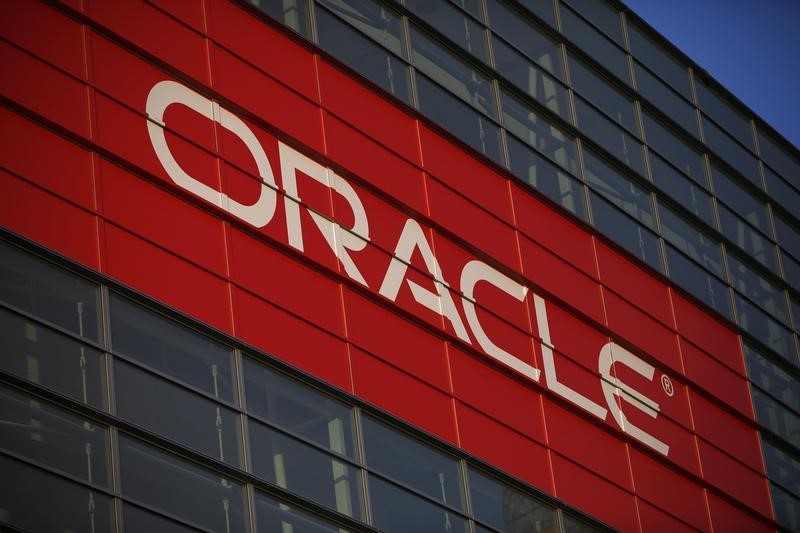On Wednesday, Oracle Corporation (NYSE:ORCL) received a new stock rating from RBC Capital. The firm initiated coverage with a "Sector Perform" rating and set a price target of $165.00 for the technology company's shares. The analyst from RBC Capital expressed concerns about Oracle's cloud infrastructure segment, Oracle Cloud Infrastructure (OCI), and its ability to compete effectively with industry giants such as Amazon (NASDAQ:AMZN) Web Services (AWS) and Microsoft (NASDAQ:MSFT) Azure.
The analyst noted that despite Oracle's efforts through multicloud strategies and partnerships, which have gained OCI some market traction, catching up with AWS and Azure remains a formidable challenge. Customer dissatisfaction with certain Oracle business practices, the differentiation between true cloud services and hosted solutions, and the uncertainties posed by the emerging General Artificial Intelligence (GenAI) landscape contribute to the skepticism regarding Oracle's competitive edge.
RBC Capital highlighted the ambitious revenue targets set by Oracle for fiscal years 2026 and 2029, suggesting that significant growth acceleration is necessary to meet these goals. This achievement, however, is considered challenging in the current market environment. While there is potential for margin expansion as OCI scales, the analyst pointed out that the high levels of capital expenditure required could restrict overall margin growth.
Furthermore, the firm addressed Oracle's Artificial Intelligence (AI) positioning, which is perceived to be overvalued in terms of its monetization potential. Although Oracle has integrated AI into its OCI and Fusion offerings, these advancements are not expected to substantially alter the company's standing in the competitive landscape. The industry's trend towards AWS and Azure for inference workloads, coupled with declining training costs, adds to the skepticism about OCI's long-term appeal.
Lastly, the analyst mentioned Oracle's absence of a common underlying data model, which could pose difficulties in leveraging the full capabilities of GenAI technology. This factor may hinder Oracle's progress in a tech industry increasingly focused on AI integration and innovation.
In other recent news, Oracle has been making significant strides in its operations and financial performance. The U.S. Army is set to migrate its Integrated Personnel and Pay System-Army (IPPS-A) to the Oracle U.S. Defense Cloud, partnering with Accenture (NYSE:ACN) Federal Services and Red River. This move is expected to result in substantial cost savings and improved HR and payroll efficiency.
Furthermore, Oracle has launched its Oracle Health Clinical Data Exchange, a cloud-based platform designed to streamline the exchange of medical claims information. This innovation aims to reduce administrative burdens and speed up patient service approvals and claims processing.
On the financial front, Oracle has successfully issued $6.25 billion in senior notes, with the net proceeds planned for debt repayment and potential future acquisitions, involving major financial institutions such as BofA Securities and Goldman Sachs & Co.
In terms of analyst updates, HSBC has raised its price target for Oracle based on the strong performance of Oracle Cloud Infrastructure. Additionally, Erste Group upgraded Oracle from Hold to Buy, citing the company's robust software offerings and expanding cloud infrastructure. Bernstein SocGen Group also adjusted its price target for Oracle, maintaining an Outperform rating. These are just some of the recent developments for Oracle.
InvestingPro Insights
Oracle's recent performance and financial metrics offer additional context to RBC Capital's analysis. According to InvestingPro data, Oracle's market capitalization stands at an impressive $485.8 billion, reflecting its significant presence in the software industry. The company's revenue for the last twelve months reached $53.81 billion, with a 5.6% growth rate, indicating steady expansion despite the competitive challenges highlighted by RBC Capital.
An InvestingPro Tip notes that Oracle has raised its dividend for 11 consecutive years, demonstrating a commitment to shareholder returns. This could be seen as a positive factor for investors, even as the company faces competitive pressures in the cloud infrastructure market.
However, another InvestingPro Tip reveals that 12 analysts have revised their earnings downwards for the upcoming period, aligning with RBC Capital's cautious stance on Oracle's growth prospects. This downward revision may reflect concerns about the company's ability to meet its ambitious revenue targets and compete effectively with cloud giants like AWS and Azure.
Oracle's P/E ratio of 43.85 and its high EBITDA valuation multiple, as noted in the InvestingPro Tips, suggest that the stock is trading at a premium. This valuation could be factoring in expectations for future growth and AI potential, which RBC Capital views as potentially overvalued.
For investors seeking a more comprehensive analysis, InvestingPro offers 18 additional tips on Oracle, providing a deeper understanding of the company's financial health and market position.
This article was generated with the support of AI and reviewed by an editor. For more information see our T&C.
